Introduction
This leaflet provides you with information about a new test called Capsule Sponge. It explains:
- What the test is and why you might need it
- How you prepare for a test
- What happens after the test
- What the risks of the test might be
- What alternatives to the test you could be offered
What is a Capsule Sponge/EndoSign test?
This new test is being introduced in a number of areas in the NHS as it has been proven in clinical trials to be a simple, safe and effective way of diagnosing conditions related to the oesophagus (gullet).
You have been referred for a Capsule Sponge to help investigate your condition to understand your current symptoms. We are evaluating the role of Capsule Sponge as an innovative alternative to endoscopy which is the usual process for diagnosing these conditions. Therefore, patients that meet specific criteria will be offered the Capsule Sponge test instead of endoscopy.
A Capsule Sponge is a small capsule on a string. The capsule is a similar size to a vitamin tablet and is made from vegetarian gelatin. The capsule contains a sponge which is designed to collect a sample of cells from your oesophagus (gullet). This will then be tested to find out if there are any cells which are unexpected or abnormal.
Problems with heartburn and acid reflux are very common but occasionally this can lead to changes in the normal cells that line your oesophagus (gullet).
Very rarely these cells can develop into pre-cancerous or cancerous cells and may lead to oesophageal cancer (cancer of the gullet). When changes to cells are found early it can make any treatment much simpler and the impact on a patient is much less significant. Patients with Barrett’s condition that meet the criteria will also be eligible for this service.
A Capsule Sponge test can help your doctor investigate and manage your symptoms.
Before your test appointment
- You should keep taking all your usual medications
- If you take any blood thinning medication please read the alert for patients on Warfarin on page 8 of this leaflet. If you take Warfarin you will need to have an INR test 7 days before your Capsule Sponge test.
- If you have diabetes please make sure your appointment is a late morning appointment (as you cannot eat or drink for 4 hours before your appointment but you can have sips of only water up until 2 hours prior to appointment)
- If you have any questions about the test or find that you cannot keep your appointment, please contact the clinic using the contact details on your Capsule Sponge referral letter.
On the day of your test
- You should have nothing to eat or drink for 4 hours before your appointment
- Take your medication as normal, but with only a little water. Please bring a list of your medications with you to your appointment
- If you are on blood thinners you will have had separate instructions
- If you have diabetes please have a light breakfast early in the morning (a minimum of 4 hours before your appointment) and take your usual medication.
At the hospital or clinic
- Please arrive on time for your appointment so that we can manage the number of patients in the clinic. Please do not arrive early for your appointment
- Your appointment will last around 30 minutes
- If you have any questions when you arrive, please ask your nurse when you are checking in
What happens during the test?
- You will be collected from the waiting room by one of the nursing team who will take you to the clinic area, your appointment will take up to half an hour.
- You will be asked some questions to check that you are ready for your test and make sure you are comfortable
- You will swallow the Capsule and string with some water. The end of the string is attached to a piece of applicator which the nurse will hold
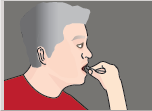
- It will take around 7 minutes for the capsule to dissolve, releasing the sponge in your stomach
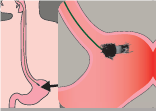
- The nurse will pull up the sponge by the string. This will only take 1 or 2 seconds and should not be painful, but you may feel like the inside of your gullet is being brushed.
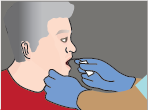
- The sponge collects cells as it passes through your gullet
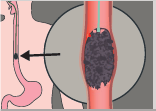
- After your test, experts will look at the sample to see if you have any signs of changes to the cells in the oesophagus (gullet)
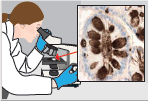
After your test
- You can go home straight after your test is completed
- If you have a sore throat after the test, suck a throat lozenge or sweet and take simple painkillers like paracetamol if required.
- If your heartburn symptoms become worse, you should continue to take your heartburn medication as prescribed
- It is very unlikely you will experience any other symptoms, however if you experience any severe pain or bleeding you should contact the clinic using the contact details on your referral letter. Outside normal opening times, please call 111 telling them that you have had a Capsule Sponge test
Potential risks
- The Capsule Sponge test has not been found to have any serious side effects
- Most people do not have any problem swallowing the capsule but if you do have a problem, we will not continue with the test
- There is an extremely small risk (less than 1/2000) that the string may become detached from the sponge or it may be difficult to remove the sponge. If this happens it is not painful or dangerous, but you will have an endoscopy to remove the sponge (the same procedure you were originally referred for)
- There is a very small chance that you may experience bleeding and this may be more likely if you are on blood thinning medication. If this happens please call us using the contact details on your referral letter. Outside normal opening times, please call 111 telling them that you have had a Capsule Sponge test
Like all tests, the Capsule Sponge may not always find all abnormalities. On very rare occasions, a serious abnormality might not be identified. If you have any questions about this, please contact the clinic using the contact details on your Capsule Sponge referral letter.
Are there alternatives to Capsule Sponge?
Capsule Sponge test has been proven in clinical trials to be a simple, safe and effective way of diagnosing conditions related to the oesophagus (gullet) and is being used in your hospital for low risk patients as an alternative to endoscopy.
If you decide not to have a Capsule Sponge test then an endoscopy will be offered. There will be a longer waiting time for an endoscopy.
If you would like to discuss an alternative, please speak to your doctor.
Asking for your consent
If you decide to go ahead with the Capsule Sponge test we will ask you to sign a consent form on the day. This confirms that you agree to have the test and that you understand what it involves.
You should make sure you have read and understood all the information you have been given. Once you have decided to have the test, bring the consent form with you to your appointment where it can be completed and signed before your procedure.
How will my data be protected?
Any member of NHS staff who has access to your confidential information is bound by NHS England confidentiality regulations and the Data Protection Act 2018 (DPA2018).
You can read our date protection leaflet.
Alert for patients on blood thinning medicines
If you are taking any blood thinning medications that may affect your clotting, you should have received specific instructions on what to do regarding these medications during the telephone call where your appointment was booked. If you have not received this information or have any questions contact the clinic using the details on your Capsule Sponge referral letter.
Warfarin
You will need to have an INR test the week before your Capsule Sponge test.
Your INR has to be 3.5 or less when you have the Capsule Sponge test.
If your INR is within your target range then continue with your usual dose.
If your INR is not within your target range, please contact your anticoagulant clinic for advice as your dose may need to be adjusted.
If your INR result is above 3.5 contact your anticoagulant clinic or GP for advice.
Anti-Platelet Medication
Clopidogrel, aspirin, prasugrel, ticagrelor and other anti-platelet medication do not need to be stopped before your Capsule Sponge test.
Other anticoagulants
You should stop any other anticoagulants the day of your Capsule Sponge test. E.g. Rivaroxaban, Apixaban, Edoxaban, Dabigatran.
Restart your medication the day after your test. Continue with your usual dose.
Frequently Asked Questions
How will an upper respiratory infection affect my appointment?
If you have any symptoms of an upper respiratory infection please ring the department – Contact number provided in your appointment letter.
What should I wear to my appointment?
Wear your normal clothes, you will be provided with a disposable bib.
Will the test hurt?
The test should not be painful, you may feel like the inside of your gullet is being lightly brushed.
If you require this information in other languages or formats, please contact the department using the contact details on your referral letter.
